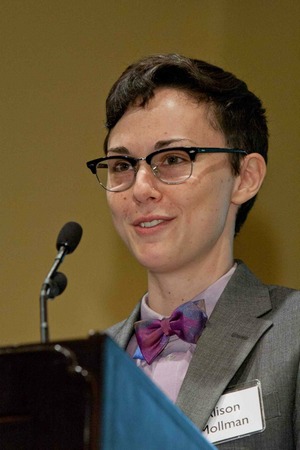
By Andrew Cohen
Ever since the third grade, Alison Mollman ’12 says her “dream job” was to become a lawyer. Sixteen years later, with a law degree almost in hand, the path toward that dream job took a happy turn when she received the Brian M. Sax Prize for Excellence in Clinical Advocacy.
At a recent luncheon ceremony in the Bancroft Hotel, Mollman was honored for her exemplary work at the Death Penalty Clinic and East Bay Community Law Center (EBCLC). Established in memory of the late Sax ’69, a highly respected San Francisco litigator and Berkeley Law lecturer, the annual prize is given to a graduating legal clinic student who best displays excellence in advocacy and professional judgment on behalf of clients.
A faculty committee chaired by Jason Schultz ’00, co-director of the Samuelson Law, Technology & Public Policy Clinic, chose Mollman from a group of nominees who worked at the law school’s various clinics. Runner up Hilda Chan ’12 received the Sax Prize honorable mention award for her stellar efforts at EBCLC’s Welfare Advocacy & Policy Practice over the past two years.
“I grew up in my dad’s law office,” Mollman said. “But when I started at Berkeley Law three years ago, I don’t think I knew much more about what being a lawyer meant than I did when I was nine. At the end of my first year … I didn’t know how to answer my mom’s questions about what type of law I wanted to practice or what I wanted to do with my life. It wasn’t until I started at EBCLC that I found the career I envisioned.”
During the summer after her first year and both semesters of her second year, Mollman was a clinical student in EBCLC’s Clean Slate Practice. She praised Clean Slate Director Eliza Hersh ’05 and staff attorney Jesse Hsieh as influential mentors at the clinic, where she carried a caseload of about 30 clients. Mollman worked extensively on factual innocence petitions and EBCLC’s policy projects, analyzing bills pending in the California legislature for their impact on people with criminal records.
“The look on a man’s face when he learns that a judge has terminated his probation early so he can enlist in the U.S. Army and, in his own words, ‘be a role model for his sons,’ is unforgettable,” Mollman said. “The tears and relief that wash over a survivor’s face when a judge removes the erroneous domestic violence arrest from her record is indescribable. These experiences made me feel like, for the first time in my life, I was doing something that mattered.”
This year, Mollman jumped in headfirst at the Death Penalty Clinic. She played a key role in the representation of a client facing the death penalty in Georgia, developing the factual and legal basis for the his litigation strategy. Mollman drafted legal pleadings and memos, consulted with forensic mental health experts, and conducted extensive field work that included two investigative trips to Georgia and one to Texas.
Ty Alper, associate director of the Death Penalty Clinic, described Mollman as “the best kind of leader: whip smart, super organized, and someone who demands excellence and accountability and lives up to her own high standards.” He also hailed her ability to “persevere in the face of adversity and maintain grace under pressure.”
Mollman, who will begin working for the Equal Justice Initiative in Montgomery, Alabama this fall, acknowledged that “it’s difficult when you know your client’s likely best-case scenario is life without the possibility of parole. To say that working in the Death Penalty Clinic can be emotionally taxing is an understatement.”
During the award ceremony, Death Penalty Clinic Director Elisabeth Semel, EBCLC Faculty Director Jeff Selbin, International Human Rights Law Clinic Director Laurel Fletcher, and Samuelson Clinic Co-Director Jennifer Urban ’00 described Berkeley Law students’ wide-ranging and far-reaching achievements over the past year.